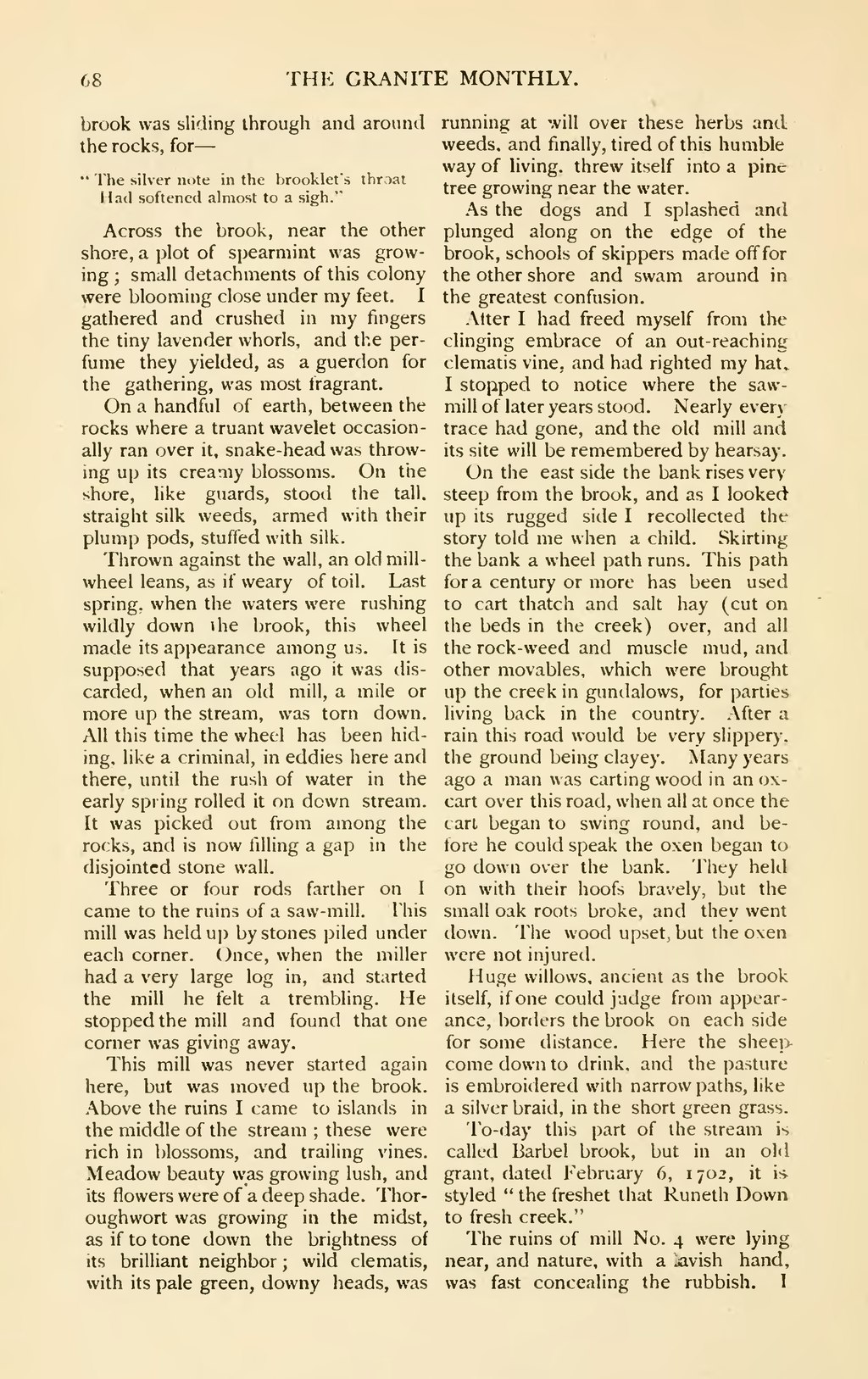68
��thp: granite monthly.
��brook was sliding through and around the rocks, for —
" The silver note in the brooklet's throat Had softened almost to a sigh."
Across the brook, near the other shore, a plot of spearmint was grow- ing ; small detachments of this colony >vere blooming close under my feet. I gathered and crushed in my fingers the tiny lavender whorls, and the per- fume they yielded, as a guerdon for the gathering, was most fragrant.
On a handful of earth, between the rocks where a truant wavelet occasion- ally ran over it, snake-head was throw- ing up its creamy blossoms. On the shore, like guards, stood the tall, straight silk weeds, armed with their plump pods, stuffed with silk.
Thrown against the wall, an old mill- wheel leans, as if weary of toil. Last spring, when the waters were rushing wildlv down ihe brook, this wheel made its appearance among us. It is supposed that years ago it was dis- carded, when an old mill, a mile or more up the streain, was torn down. All this time the wheel has been hid- ing, like a criminal, in eddies here and there, until the rush of water in the early spring rolled it on down streain. It was picked out from among the rocks, and is now filling a gap in the disjointed stone wall.
Three or four rods farther on I came to the ruins of a saw-mill. This mill was helduj) by stones piled under each corner. Once, when the miller had a very large log in, and started the mill he felt a trembling. He stopped the mill and found that one corner was giving away.
This mill was never started again here, but was moved up the brook. Above the ruins I came to islands in the middle of the stream ; these were rich in blossoms, and trailing vines. Meadow beauty vvas growing lush, and its flowers were of a deep shade. Thor- oughwort was growing in the midst, as if to tone down the brightness of its brilliant neighbor ; wild clematis, with its pale green, downy heads, was
��running at will over these herbs and weeds, and finally, tired of this humble way of living, threw itself into a pine tree growing near the water.
.'^s the dogs and I splashed and plunged along on the edge of the brook, schools of skippers made off for the other shore and swam around in the greatest confusion.
Alter I had freed myself from the clinging embrace of an out-reaching clematis vine, and had righted my hat,. I stopped to notice where the saw- mill of later years stood. Nearly ever}'^ trace had gone, and the old mill and its site will be remembered by hearsay.
On the east side the bank rises very steep from the brook, and as I looked up its rugged side I recollected the story told me when a child. Skirting the bank a wheel path runs. This path for a century or more has been used to cart thatch and salt hay (cut on the beds in the creek) over, and all the rock-weed and muscle mud, and other movables, which were brought up the creek in gundalows, for parties living back in the country. After a rain this road would be very slippery, the ground being clayey. Many years ago a man was carting wood in an ox- cart over this road, when all at once the carl began to swing round, and be- fore he could speak the oxen began to go down over the bank. They held on with their hoofs bravely, but the small oak roots broke, and they went down. The wood upset, but the oxen were not injured.
Huge willows, ancient as the brook itself, if one could judge from appear- ance, borders the brook on each side for some distance. Here the sheep come down to drink, and the pasture is embroidered with narrow paths, like a silver braid, in the short green grass.
To-(iay this part of the stream is called Barbel brook, but in an old grant, dated February 6, 1702, it is- styled " the freshet that Runeth Down to fresh creek."
The ruins of mill No. 4 were lying near, and nature, with a lavish hand, vvas fast concealing the rubbish. I
�� �
